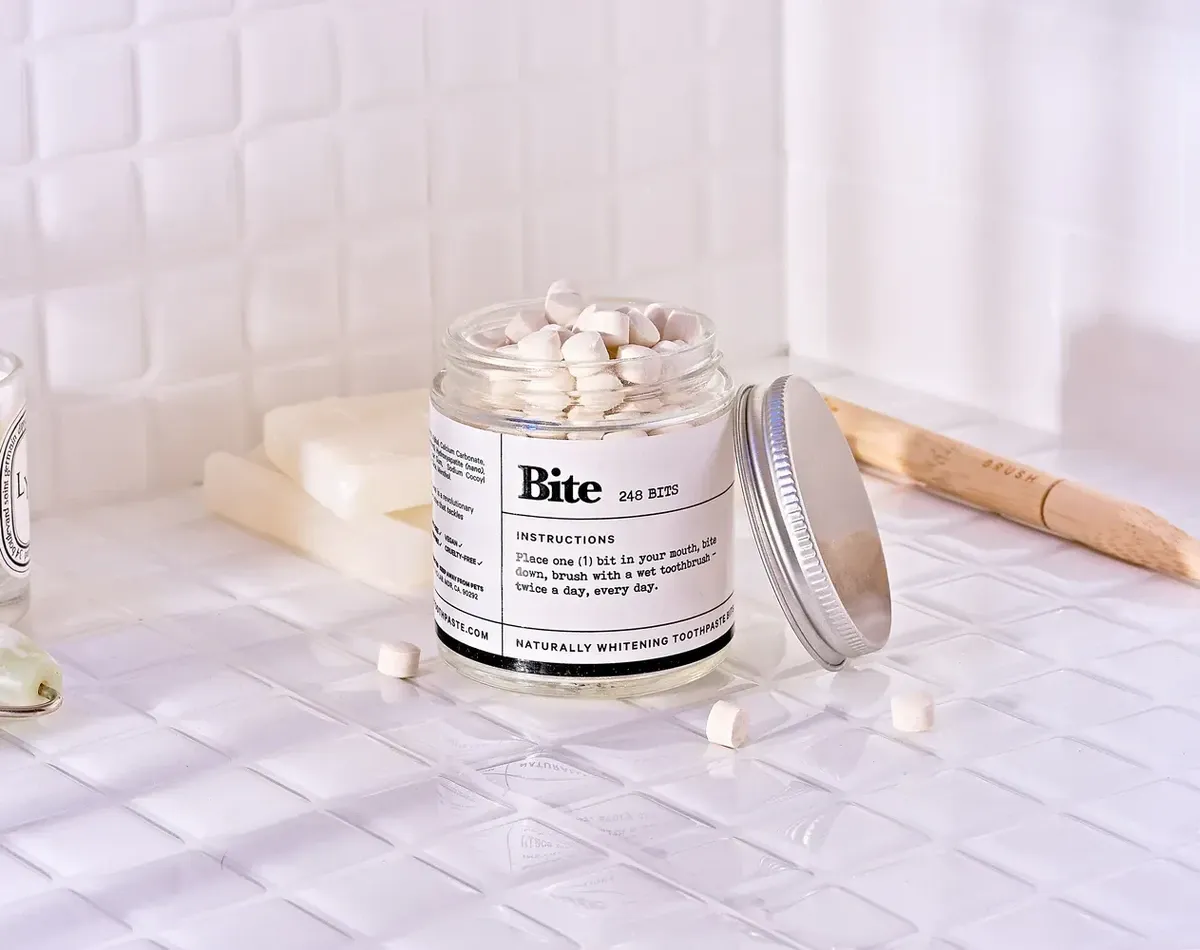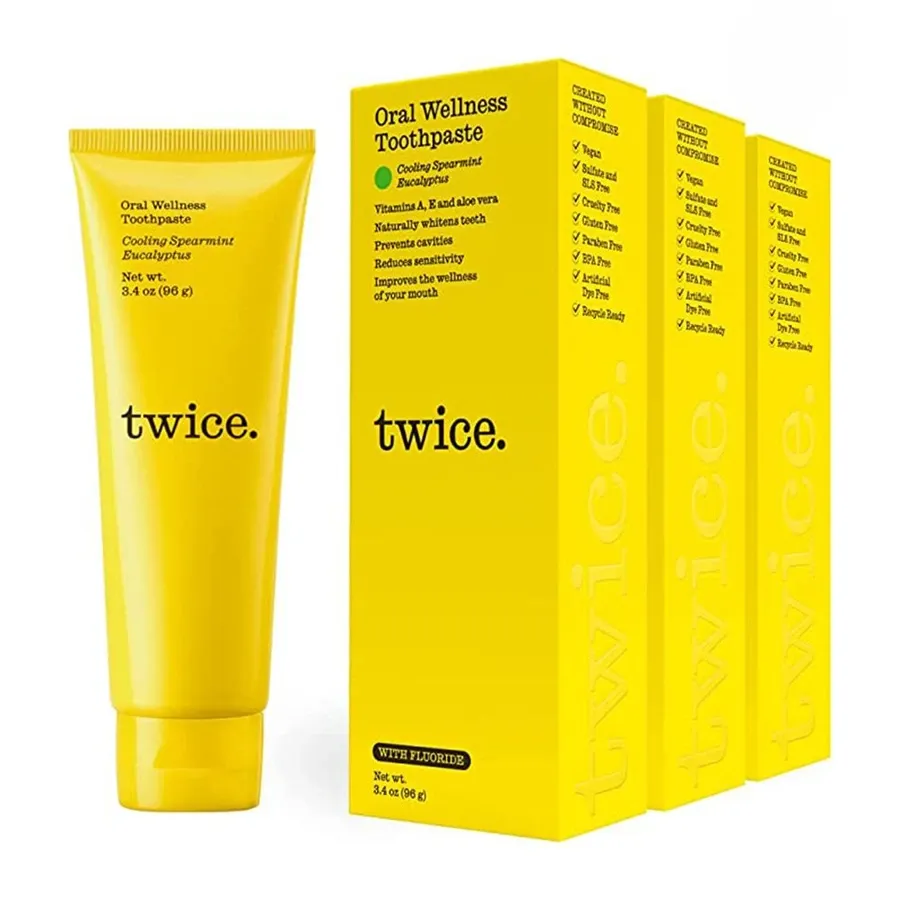8 Best Toothpaste for Sensitive Teeth in 2025

In this article, we may include products or services we think are useful for our readers. If you buy through links on this page, we may earn a small commission to help fund our mission to create more healthy smiles. Here’s our process.
Finding the best toothpaste for sensitive teeth is important for people with tender, hypersensitive teeth. Ingredients like arginine and calcium carbonate are crucial as they help in sealing pathways and providing relief from sensitivity and pain. Even if reading labels on oral care products seems a bit overwhelming, there are a couple of easy steps you can follow to find the best sensitive toothpaste for teeth in a matter of minutes. Knowing what to look for—and more importantly, avoid—can help you see significant results in a matter of days.
Regardless Of The Brand, Make Sure They Have This…
1. ADA Seal of Acceptance
How can you know whether or not you’re picking the best toothpaste for sensitive teeth? Look at the label. If it has the ADA seal of acceptance on the box, you know that it’s clinically proven to help with whatever the claim is on the packaging. In this case, tooth sensitivity. The ADA seal of acceptance usually takes about five years for a product to earn. Most dentists and hygienists will tell you to choose products with the ADA seal, as they can be trusted to work regardless of which brand it is.
2. Fluoride & Potassium Nitrate
3. Sensitivity Relief vs. Sensitive Whitening
Some people prefer fluoride-free toothpaste, which uses alternative ingredients like hydroxyapatite, arginine, and calcium carbonate to provide protection from sensitivity and strengthen enamel.
Some types of toothpaste for sensitive teeth will be a combination blend that is both for whitening as well as sensitivity. People who prefer to use whitening toothpaste but tend to get sensitive teeth from it may prefer using this type of product instead. Whitening toothpaste for sensitive teeth is more of a maintenance product to help reduce new stain buildup without triggering sensitivity. On the other hand, if you’re purposely trying to treat sensitive teeth, it may be best to avoid any types of toothpaste that say “whitening” on them.
Related: Best Whitening for Sensitive Teeth
Best Toothpaste For Sensitive Teeth
What are some of the top brands of toothpaste for sensitive teeth? If you haven’t talked with your dentist or hygienist, here are some safe products to try out on your own:
1. Sensodyne Rapid Relief Sensitivity Toothpaste
Best Overall
Sensodyne toothpaste is probably the top-recommended toothpaste for sensitive teeth. This brand uses either potassium nitrate or fluoride. Bonus, most of them are free of sodium lauryl sulfate (SLS) which can sometimes irritate people’s mouths.
- ADA-approved
- Contains fluoride
- SLS-free
- Quick sensitivity relief
- Mint
There are several different types of Sensodyne toothpastes on the market. All of them are effective, but they have added perks like plaque control or whitening. When in doubt, go with the rapid relief sensitive toothpaste (“Rapid Relief” version), which can provide results in as quickly as 3 days.
2. Bite Toothpaste Bits Fluoride-Free
Best Sensitivity Tablet Toothpaste
Bite uses nano-hydroxyapatite (n-Ha), which has been used in Japan for over 40 years. Powered by n-Ha, a 100% non-toxic ingredient that remineralizes and desensitizes teeth without triggering sensitivity. Bite has both fluorinated and fluoride-free toothpaste.
- SLS-free
- Contains nano-hydroxyapatite (n-Ha)
- Paraben-free
- Sensitivity-fighting
- Free from artificial flavoring
- Free from sulfates
- Contains xylitol
Bite toothpaste tablets uses powerful ingredients like bacteria-fighting xylitol and refreshing menthol.
3. Colgate® Sensitive Complete Protection Toothpaste
Best Complete Protection
Colgate® Sensitive Complete Protection Toothpaste boasts that it contains the “maximum-strength FDA allowed anti-sensitivity active ingredient” in its product. Not only is it great for managing tooth sensitivity, but it also helps protect teeth against tartar buildup and cavities while it cleans.
- Clinically Proven Sensitivity Relief
- Provides 24/7 Sensitivity Protection (with twice-daily brushing)
- Maximum Strength FDA-allowed Antisensitivity Active Ingredient
- Helps to Repair and Strengthen Painful Sensitivity and Weakened Tooth Enamel
People also say that it tastes good and leaves their breath feeling fairly fresh after using it, so that’s also a win! Colgate sensitive pro relief is also a great one to checkout!
4. Twice Sensitive Teeth Whitening with Fluoride
Best Sensitive Whitening Toothpaste
If you have severe sensitivity, you want to go with a non-whitening sensitive toothpaste. Twice-sensitive toothpaste aids in preventing new stain buildup without triggering sensitivity.
- Not ADA-approved
- SLS-free
- Plant-Based
- Cruelty-free
Twice toothpaste is cruelty-free and clean. It also doesn’t contain any SLS. Some people do complain about the lavender mint taste only tastes like mint, but it does leave a fresh feeling in your mouth. It also has a 7 PH which helps keep your microbiome in balance.
5. Hello Sensitivity Relief Fluoride Toothpaste
Best Natural Sensitivity with Fluoride
You can pick this toothpaste up at Ulta, Amazon, and Target. The cost-effective product also contains coconut oil for extra soothing relief while you’re using it. One of the perks of Hello Sensitivity toothpaste is that its naturally friendly ingredients also include fluoride. This is quite notable since a lot of “holistic” products tend to remove this essential mineral from their products, as it’s vital for healthy teeth.
Additionally, Tom's of Maine offers a Fluoride-Free Rapid Relief Sensitive Toothpaste, which is all-natural and clinically proven to be effective for individuals with sensitive teeth.
6. Arm & Hammer Sensitive Teeth & Gums Toothpaste
Best Affordable Sensitivity Toothpaste
This low-abrasion formula is meant for also whitening your teeth while you brush them. It’s made by the makers of Orajel, which if you remember, is a product that helps relieve tooth and gum pain. While it does contain a couple of abrasives and SLS, it still has the sodium fluoride and potassium nitrate that you need for managing tooth sensitivity.
- Helps maintain healthy gums
- Fluoride cavity protection
- FDA-approved
7. Up & Up Extra Sensitive Whitening Toothpaste (Target)
Best Generic Brand Sensitivity Toothpaste
Target’s store brand-sensitive toothpaste is 100% satisfaction guaranteed and available at a lower cost than a lot of other major toothpaste brands. The ingredients do say to use at least a one-inch strip of toothpaste (normally it’s a pea-sized amount) and to use it no more than three times a day. It’s comparable to Sensodyne Extra Whitening toothpaste.
- Contains Fluoride
- Compared to Sensodyne Extra Whitening
- Helps with Teeth Whitening
8. Crest Pro-Health Toothpaste, Sensitive and Gum
Best Sensitivity + Gum Health
There are a couple of different variations of Crest Pro-Health Toothpaste, one being Sensitive and Enamel Shield and the other being Gum and Sensitivity. Both begin working immediately and claim to offer relief within a matter of days. The Enamel Shield variation also helps with whitening, so you might want to go with the Gum and Sensitivity version if you’re trying to avoid anything with whitening in it.
- ADA-approved
- Found in stores nationwide
As you might guess from an established toothpaste brand, Crest also contains the ingredients necessary to help combat acid erosion, gingivitis, plaque, and cavities, making it a great all-around toothpaste for just about anyone with sensitive teeth.
Why Do I Have Sensitive Teeth
Teeth can be sensitive for several different reasons. Cold sensitivity is the most common. You might just have generally sensitive teeth, or you could have areas of gum recession where the roots are exposed. In those cases, the roots tend to be hypersensitive because they have thousands of tiny nerve endings not covered by tooth enamel.
Sensitivity to heat or sweets usually means tooth decay or a dying nerve inside your tooth. These symptoms shouldn’t be addressed with something simple like toothpaste; you need to see your dentist ASAP.
Regardless of who you are and how healthy your teeth may be, biting straight into something cold like ice cream will probably still make your teeth sensitive. There really isn’t anything to do about it. But if you can’t drink a cold beverage, that’s different.
And finally, using the wrong toothpaste or oral care products can make your teeth sensitive. In particular, anything with whitening ingredients. Whitening toothpaste, whitening mouthwash, and bleaching agents do tend to make teeth sensitive if not used properly. Using toothpaste with stannous fluoride can help treat sensitive teeth by blocking exposed tubules and strengthening the enamel.
How Does Sensitivity Toothpaste Work
Why Must It Have Fluoride?
Using toothpaste for sensitive teeth helps restore lost fluoride minerals into the tiny tubules across your tooth surfaces. These tubules house small nerve endings, which trigger tooth sensitivity. As you place fluoride minerals back onto the tooth, it helps to strengthen your enamel so that the tubules are less prone to sensitivity when you eat, drink, or breathe in through your mouth. Learn more about stannous fluoride and sodium fluoride here.
Trying to combat tooth sensitivity without fluoride will be an uphill oral health battle. The best sensitive toothpaste will nearly always include this ingredient.
Potassium nitrate and calcium carbonate are active ingredients that are specially formulated in toothpaste for sensitive teeth. Unlike fluoride, the potassium nitrate ingredients work as natural soothers to the sensitive nerve endings. It also works with fluoride to help close up or block off the pores/tubules that house your tooth nerves. Combining the two makes the sensitive toothpaste work more quickly when it comes to managing your symptoms.
SIDE NOTE: Remember not to scrub your teeth too hard. If you’re an overzealous tooth brusher, scrubbing or using harder toothbrush bristles will damage your enamel and gum tissue, exposing more sensitive areas and receding gums. Treating sensitive teeth with damaged gums is much harder!
Talk To Your Dentist
Always be sure to communicate dental symptoms to your dentist and hygienist, even if you think they seem minor or not important. Diagnosing dental issues tends to require a bit of detective work. Even the slightest twinges here and there can range from minor, reversible issues to complex needs that require immediate attention.
The best time to talk to your dentist about your tooth sensitivity is during your six-month checkup. If you see your hygienist first, they can also help you figure out what’s going on. Be sure to communicate the type of symptoms you’re feeling, how often they occur, and if you notice any factors that cause your sensitive teeth to trigger flare-ups. Such as types or temperatures of foods, pressure, or gum swelling.
When should you schedule an exam or emergency appointment for sensitive teeth? If your symptoms are preventing you from going about normal activities—like going to work or being able to eat—then you need to make an appointment. Or, if moderate sensitivity continues to persist after using sensitive toothpaste for two weeks, it’s best to go ahead and plan a visit with your dental team.
The Best Toothpastes For Sensitive Teeth
Using the wrong toothpaste can make your teeth sensitive. Understanding the types of tooth sensitivity can help you decide if you just need to use toothpaste for sensitive teeth or actually go to the dentist for treatment. Cold sensitivity and whitening-induced sensitivity are common. Selecting the best sensitive toothpaste can help you reverse symptoms within about two weeks. When in doubt, look for one that’s labeled with the ADA seal of acceptance on the box, because you know it will work. If your symptoms don’t improve within a couple of weeks and you’ve already cut out any extra whitening products, be sure to see your dentist. The last thing you want to do is accidentally ignore symptoms of a serious condition like decaying enamel or gum disease.





